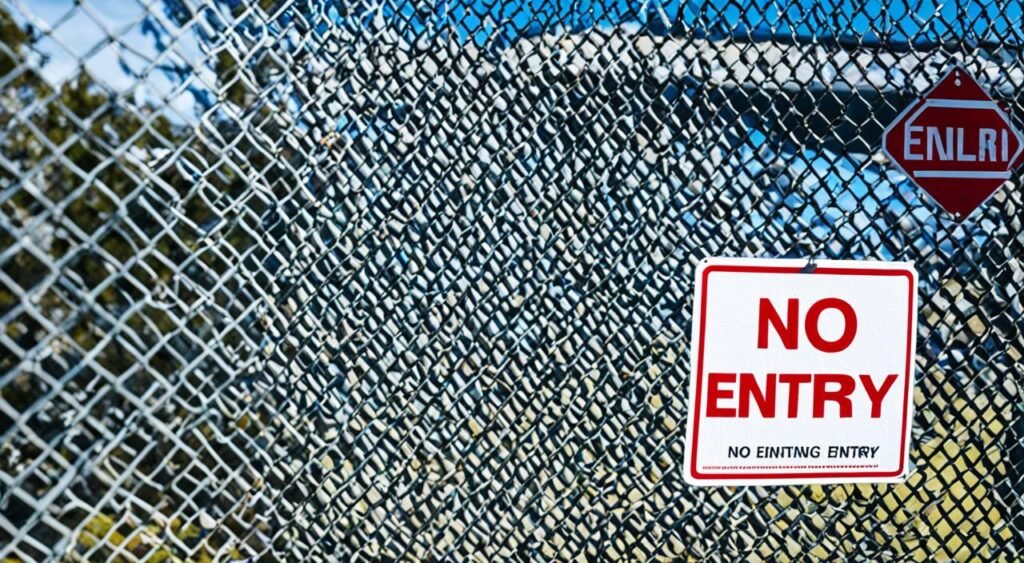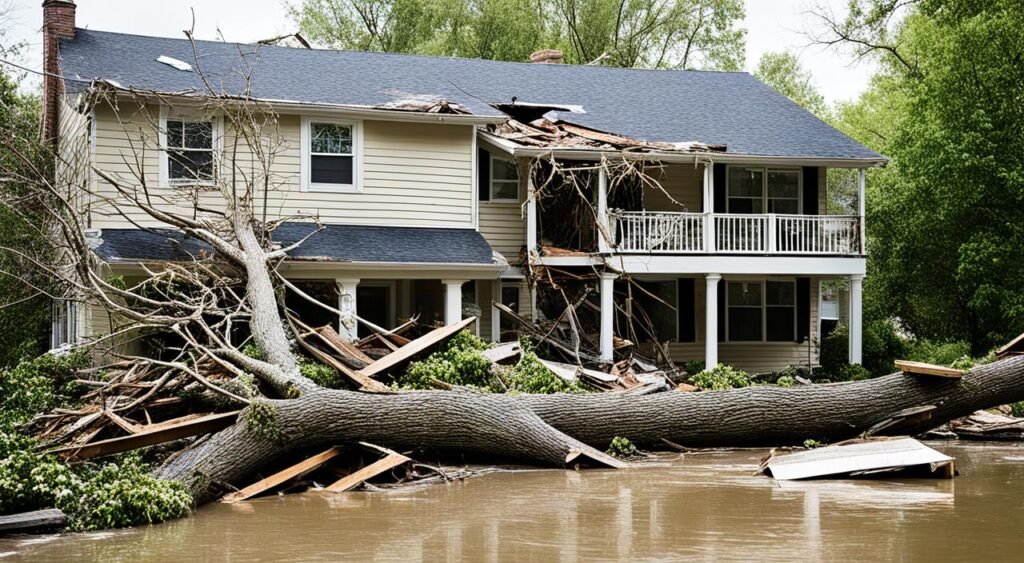Property insurance covers a lot, from protecting the structure to covering personal belongings. It offers two key types of coverage: property protection and liability coverage. This means it helps property owners with costs if their property is damaged or someone gets hurt there. Policies like homeowners insurance, renters insurance, flood insurance, and earthquake insurance fall under this category.
Most of your personal items are protected by homeowners or renters insurance. But, if you have things that are very valuable, you might need extra coverage. This extra coverage is called a rider. When you file a claim, you can get reimbursed for either the actual value of the damage or the replacement cost to fix it.
Key Takeaways
- Property insurance covers both the structure of the property and the owner’s personal belongings.
- Policies can include homeowners, renters, flood, and earthquake insurance.
- Reimbursement is provided for the actual value of the damage or the cost to repair or replace the property.
- High-value personal items may require additional coverage through a policy rider.
- Understanding the details of a property insurance policy is crucial to ensuring adequate coverage.
Property Insurance: Protecting Your Investment
Property insurance gives financial help to property owners and renters if something bad happens. It includes the building, what’s inside, and covers if someone gets hurt there. Property insurance includes types like homeowners insurance, renters insurance, flood insurance, and earthquake insurance.
Understanding the Concept of Property Insurance
Property insurance safeguards your asset, be it a home you own or rent. It helps pay for damage or repairs from a covered event. This protection is critical for sudden disasters or if someone breaks in, saving you from big financial hits property and casualty insurance else’s injuries or property damage national flood insurance program quote today property and casualty insurance damage to your home coverage needs.
Types of Property Insurance Policies
Homeowners and renters insurance look after personal property. Meanwhile, flood insurance and earthquake insurance handle specific natural emergencies. These policies keep your investment safe and offer you peace by ensuring you’re covered for unexpected events.
Homeowners Insurance: Comprehensive Coverage

A standard homeowners policy, called an HO-3, covers your home and personal property comprehensively. It includes dwelling coverage for your home’s structure and personal property coverage for your items. This plan protects your home against fire, theft, and harm from the weather.
Dwelling Coverage: Protecting Your Home’s Structure
Dwelling coverage in homeowners insurance is vital. It helps pay for fixing or rebuilding your home if it’s damaged. Such damage could come from fire, theft, or natural disasters. With proper dwelling coverage, you can relax, knowing your home is safe.
Personal Property Coverage: Safeguarding Your Belongings
Personal property coverage shields your personal belongings. This includes furniture, electronics, and clothes against covered perils. Should they be stolen or ruined, this coverage helps you replace them. It ensures you can get your home and life back to normal.
Liability Protection: Guarding Against Legal Claims
Liability protection saves you from financial worry if someone is hurt at your place and sues. It covers legal costs and any payouts, saving your personal assets.
Homeowners insurance might also pay to rebuild your home or replace your items, either in replacement cost or actual cash value. The policy might need more if you have expensive items or need protection against flooding.
Renters Insurance: Safeguarding Your Personal Belongings

Renters insurance, labeled as an HO-4 policy, secures your personal belongings. It includes protection if others are injured at your rental property. But, it doesn’t protect the structure itself; for that, you need the landlord’s insurance.
This insurance shields your personal possessions like furniture and clothes. It does so against dangers like fire, theft, and water issues. Also, there’s liability coverage if you’re at fault for damages or injuries to others. Most policies will let you choose between replacement cost and actual cash value. Plus, you might add more protection for expensive items.
Buying renters insurance safeguards what’s yours and offers key liability protection. Knowing its advantages and picking the right home insurance can keep your stuff safe. It gives you peace of mind while living in a rental home.
Flood Insurance: Protecting Against Water Damage
Flood insurance helps with the costs of floods. It covers things that are not in your home policy. For those living in flood-prone areas, it’s vital. It helps with repair costs and replacing items after a flood.
Understanding the Need for Flood Insurance
Home insurance may cover water damage from pipes or appliances. But when it comes to external flo
Earthquake Insurance: Preparing for Natural Disasters
Earthquake insurance is a special policy for damage from earthquakes, not covered by most home insurance. People living in earthquake-prone areas should look into getting earthquake insurance. It protects their home and things inside if an earthquake hits.
Assessing Your Risk of Earthquake Damage
When deciding on earthquake insurance, start by figuring out your risk of earthquake damage. Your home’s geographical location, construction type, and area seismic activity history matter. Knowing your earthquake risk helps choose the right coverage options.
Scope of Earthquake Insurance Coverage
Earthquake insurance policies can help with many damages, like your home’s structure and personal things. They might also cover additional living expenses if your home is not safe to live in. But, the amount the policy pays out and your part of the cost can be different. Read all the policy details to make sure it fits your needs.
Learning about the claims process and what happens after an earthquake makes it easier to recover. This information can help property owners get ready and return to normal faster after a quake.
Property Insurance: Exclusions and Limitations

Property insurance is great for homeowners and renters. But, it’s important to know what’s not covered in these policies. They often exclude certain things, which could surprise you with extra costs.
Common Exclusions in Property Insurance Policies
Usually, they don’t include damage from things like floods or earthquakes. They also skip covering wear and tear, bugs, or damage you meant to do. Knowing what your policy does and doesn’t cover is key. This ensures you’re ready for any unexpected events.
Understanding Policy Limits and Deductibles
These policies also spell out how much they’ll pay for different things. For instance, how much for your stuff or liabilities. This can really affect how well you’re covered. Plus, there’s the deductible, which you have to pay first. It’s wise to look at these details. This way, you can avoid any surprises in the future.
Knowing the details of your policy is crucial for homeowners and renters. It allows for smart choices to safeguard their assets. Plus, it helps reduce the risk of unexpected financial hits.
Choosing the Right Property Insurance Coverage
When selecting property insurance, homeowners and renters need to look closely at their needs. This means checking how much their home or rental property is worth. They also need to look at the value of their things and risks they might face.
Evaluating Your Property Insurance Needs
People should think about the policy’s limits, deductibles, and costs. For example, if you live in an area prone to floods or earthquakes, you might need additional coverage. This helps make sure you’re protected enough.
Comparing Insurance Providers and Policies
Looking at various insurance providers can help get the best deal. This involves checking out customer service, discounts, and how claims are handled. By doing this, you can find the best property insurance for your needs.
Property Insurance: Claims and Reimbursement

When bad things happen, filing a property insurance claim is key to getting back on your feet. You’ll need to show what happened and what was lost. Then, a claims adjuster checks things out. They figure out what you get back.
Filing a Property Insurance Claim
Got damage or theft? You need to show it all, like with photos and repair quotes. Be ready with any repair or temporary living costs. Work with the claims adjuster. Follow what your insurance company says. This makes sure you get your money fast and accurate.
Replacement Cost vs. Actual Cash Value
Your insurance policy decides if it pays to replace items or just their current value. Know this to get the right payout for repairs or new things. How much your policy covers and its deductibles affect what you get back.
| Coverage Type | Description | Advantages | Disadvantages |
|---|---|---|---|
| Replacement Cost | Pays the full cost to replace a lost or damaged item, without counting its age. | Ensures you can fully repair or replace items without being too costly. | May come with a higher premium cost. |
| Actual Cash Value | Looks at an item’s age and condition to decide its replacement cost. | Often costs less in premium payments. | It might not fully cover the item’s replacement cost. |
Stick to the claims process and keep in touch with your insurer. This way, you’ll make the most of your policy. You’ll get the right money back for your losses.
Also Read: How To Choose An International Travel Insurance Plan
Conclusion
Property insurance is crucial for those who own or rent homes. It covers the home structure, belongings, and liability risks. While basic policies like homeowners insurance and renters insurance give some coverage, extras like flood insurance or earthquake insurance might be necessary for special risks. It’s really important to understand what your property insurance covers, including what it doesn’t, along with the limits and deductibles.
The way claims are handled and what you’ll be paid are key too. Whether it’s replacement cost or actual cash value matters. People should think about what they need and compare plans from several insurance providers. It ensures they get the best property insurance to safeguard their most precious items.
Having solid property insurance can give a sense of security and protect your finances. It helps homeowners and renters bounce back from unforeseen events. Knowing the details and choosing the right policy can keep your home and belongings safe and secure.
FAQs
Q: What does property insurance cover?
A: Property insurance provides coverage for your home and personal property against damage or loss caused by covered perils such as fire, theft, vandalism, and natural disasters.
Q: How can I get a property insurance quote?
A: You can get a property insurance quote by contacting insurance agencies, using online platforms to request quotes, or speaking with an insurance agent.
Q: What does commercial property insurance cover?
A: Commercial property insurance provides coverage for business properties, equipment, inventory, and any potential liabilities that a business may face.
Q: Why is it important to protect your home with property insurance?
A: Protecting your home with property insurance helps safeguard your investment from unexpected events such as fires, natural disasters, or theft, providing financial security and peace of mind.
Q: How can I get a homeowners insurance quote online?
A: You can get a homeowners insurance quote online by visiting insurance company websites, filling out their quote request forms, and providing the necessary information about your property.
Q: What additional coverage options are available with property insurance?
A: Additional coverage options with property insurance may include liability coverage, coverage for rental properties, business property coverage, and personal property insurance.
Q: How can I learn more about property insurance and homeowners insurance quotes?
A: You can learn more about property insurance and homeowners insurance quotes by accessing insurance resources online, speaking with insurance agents, or visiting insurance company websites to get a free quote.
Source Links
- https://www.investopedia.com/terms/p/property-insurance.asp
- https://www.usnews.com/insurance/homeowners-insurance/what-does-homeowners-insurance-cover
- https://www.geico.com/property-insurance/

